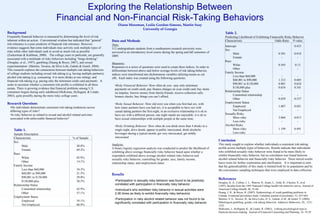Exploring the Relationship between Financial and Non-financial Risk Taking Behavior
- 1. Exploring the Relationship Between Financial and Non-Financial Risk-Taking Behaviors Diann Moorman, Leslie Gordon-Simons, Martin Seay University of Georgia Background Table 2. Frequently financial behavior is measured by determining the level of risk Predicting Likelihood of Exhibiting Financially Risky Behavior inherent within an action. Conventional wisdom has indicated that ŌĆ£generalŌĆØ Data and Methods Characteristic Odds-Ratio P-value risk tolerance is a poor predictor of financial risk tolerance. However, Data: Intercept 0.433 evidence suggests that some individuals may actively seek multiple types of 312 undergraduate students from a southeastern research university were Sex risks while other individuals seek to avoid as much risk as possible surveyed in an introductory level course during the spring and fall semesters of (Zuckerman & Kuhlman, 2000). The college years in particular, are generally Male 0.501 0.018 2009. Female - - associated with a multitude of risky behaviors including ŌĆ£binge drinkingŌĆØ (Douglas, et al., 1997), gambling (Huang & Boyer, 2007), and sexual Race Measures: experimentation (Martins, Tavares, da Silva Lobi, Galetti & Gentil, 2004). White 0.565 0.13 Responses to a series of questions were used to create three indices. In order to This research explores the connections between multiple risk taking behaviors Other - - differentiate between above and below average levels of risk taking behavior, of college students including sexual risk-taking (e.g. having multiple partners), Family Income indices were transformed into dichotomous variables utilizing means as cut alcohol risk-taking (e.g. consuming 4 or more drinks at one sitting), and Less than $60,000 - - offs. Each index was created using the following questions: financial risk-taking (e.g. paying only the minimum credit card payment). It $60,001 to $90,000 1.212 0.685 seeks to ascertain whether a consistent risk profile is exhibited in all three $90,001 to $130,000 0.801 0.624 ŌĆóRisky Financial Behavior: How often do you --pay only minimum arenas. There is growing evidence that financial problems among U.S. $130,000 plus 0.654 0.341 payments on credit cards, pay finance charges on your credit card, buy items consumers begins during early adulthood (McKenna, Hyllegard, & Linder, Relationship Status on impulse, borrow money from family/friends, receive collection calls, 2003), quite possibly during the more risky college years. Committed relationship - - bounce checks, buy things you canŌĆÖt afford; Other 0.859 0.537 Research Questions ŌĆóRisky Sexual Behavior: How old were you when you first had sex, with Employment Status ŌĆóDo individuals demonstrate consistent risk-taking tendencies across how many partners have you had sex, it is acceptable to have sex with Employed 1.807 0.021 differing types of risks? casual dating partners the first night, in an exclusive relationship it is ok to Not Employed - - ŌĆóIs risky behavior as related to sexual and alcohol related activities have sex with a different person, one night stands are enjoyable, it is ok to Sexually Risky associated with unfavorable financial behavior? have sexual relationships with multiple people at the same time; More risky 2.064 0.013 Less risky - - ŌĆóRisky Drinking Behavior: How often do you drink more than 4 drinks in a Alcohol Risky Table 1. single night, drive drunk, appear in public intoxicated, drink alcoholic More risky 1.199 0.491 Sample Description beverages during a typical month, get very intoxicated, get mildly Less risky - - Characteristic % of Sample intoxicated Sex Conclusion Analysis: This study sought to explore whether individuals a consistent risk-taking Male 30.8% A binary logistic regression analysis was conducted to predict the likelihood of profile across multiple types of behaviors. Results indicate that individuals Female 69.2% exhibiting above average financially risky behavior based upon whether a who exhibited sexually risky behavior were found to be more likely to Race respondent exhibited above average alcohol related risky behavior and exhibit financially risky behavior, but no correlation was found between White 85.9% alcohol related behavior and financially risky behavior. These mixed results sexually risky behavior, controlling for gender, race, family income, Other 14.1% relationship status, and employment status. leave room for further exploration and clarification. It is important to note Family Income that the generalizability of this study is limited both by its population and by Less than $60,000 10.3% the convenience sampling techniques that were employed in data collection. $60,001 to $90,000 21.5% Results $90,001 to $130,000 29.8% ŌĆóParticipation in sexually risky behavior was found to be positively References $130,000 plus 38.5% Douglas, K. A., Collins, J. L., Warren, D., Kann, L., Gold, R., Clayton, S., et al. Relationship Status correlated with participation in financially risky behavior. (1997). Results from the 1995 National College health risk behavior survey. Journal of Committed relationship 42.9% ŌĆóIndividualŌĆÖs who exhibited risky behavior in sexual activities were American College Health, 46, 55-66. Other 57.1% 2.06 times as likely to exhibit financially risky behaviors. Huang, J. H., & Boyer, R. (2007). Epidemiology of youth gambling problems in Employment Status Canada: A national prevalence study. Canadian journal of psychiatry, 52, 657-665. ŌĆóParticipation in risky alcohol related behavior was not found to be Martins, S. S., Taveres, H., da Silva Lobo, D. S., Galetti, A.M., & Gentil, V. (2004). Employed 39.1% Pathological gambling, gender, risk-taking behaviors. Addictive Behaviors, 29,, 1231- significantly correlated with participation in financially risky behavior. Not Employed 60.9% 1235. McKenna, J., Hyllegard, K., & Linder, R. (2003). Linking psychological type to financial decision-making. Journal of Financial Counseling and Planning, 14, 19-29
